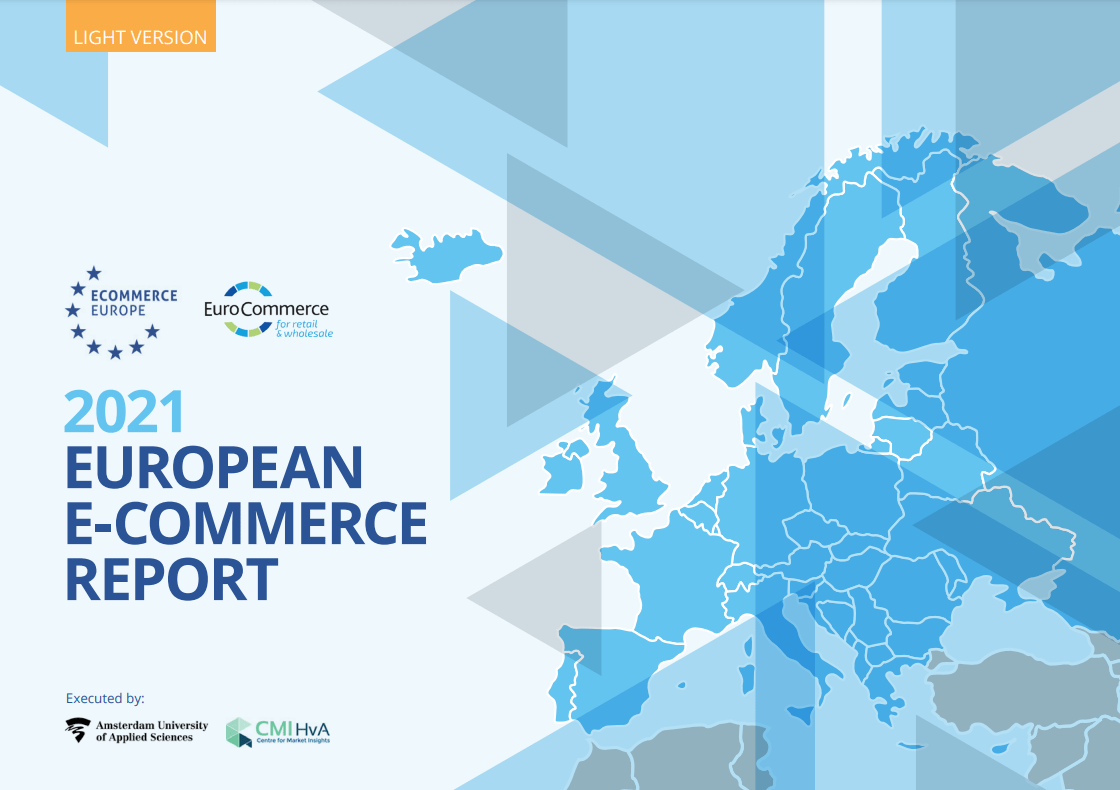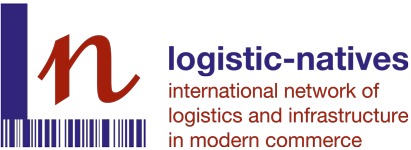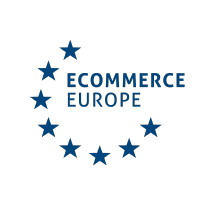
PRESS RELEASE
14. Januar 2021
E-commerce still growing: accelerated digitalisation of
businesses and consumers
Ecommerce Europe and EuroCommerce today jointly published the 2021 European E-commerce Report.
In 2020, total European e-commerce grew to €757 billion euros, up 10% from €690 billion euros in 2019. 2020 was an exceptional year, marked by the COVID-19 pandemic and the consequent important role of e-commerce for both society and economy. This is also reflected in the growth figures, which remained significant (10%), but dropped slightly compared to 2019 (14%). COVID-19 gave a significant boost to ecommerce sales, but the sharp decline of online sales in the tourism and services sector (events, tickets, etc.) contributed to holding back overall growth.
The pandemic had a massive impact on developments in the retail sector. The lockdown accelerated the existing trend towards the digital and green transition of stores. Their investments in digital and omnichannel, which were originally planned over several years, were carried out in just a few months. Ecommerce was a lifeline for consumers, as government restrictions such as forced shop closures, prevented them from buying what they needed in stores. While e-commerce has not fully compensated the losses that many brick-and-mortar SMEs experienced, it has absorbed a large part of the economic shock.
However, further work is needed to ensure the wider retail sector can optimally benefit from the solutions offered by the digital transformation. Luca Cassetti, Secretary General of Ecommerce Europe, commented: “The past year has exposed the importance of digital transformation. E-commerce has proven to be exceptionally well placed to facilitate the digitalisation of retail and create a seamless shopping experience for consumers. Physical stores opened up new online sales channels, SMEs have been able to access new markets through e-commerce, and merchants have increasingly adopted omnichannel commerce solutions, such as click-and-collect, to accommodate the ever-changing health requirements and consumer needs. However, the transition is not yet completed. Policymakers need to recognise the potential of digital commerce and invest more in new technologies and digital skills while creating a harmonised, channel-neutral and future-proof legislative framework”.
Christian Verschueren, Director-General of EuroCommerce, commented: “The retail and wholesale sector is going through a significant transformation process. Government restrictions and rising consumer demand accelerated digitalisation. Consumers who were hitherto unfamiliar with buying online or on their mobile devices have become accustomed to it, and are likely to continue to use this and a mixture of channels. Before the pandemic, 70% of retailers and wholesalers had no facilities for online sales, and those physical stores who did have an online presence overcame the challenges better. But the problem remains, and we are calling on governments and EU policy makers to support the digital transformation of the sector, address unjustified manufacturer restrictions on selling on online platforms, and create a regulatory framework that provides for a channel-neutral and future-proof policy environment”.
Today, from 10h00 to 11h00 CEST, Ecommerce Europe and EuroCommerce will hold a webinar during which the 2021 European E-commerce Report will be launched. To register for the webinar, please click here.
Ecommerce Europe and EuroCommerce would like to thank the Centre for Market Insights of the Amsterdam University of Applied Sciences for preparing this report.

To download the light version of the report, please click here.
NOTES FOR EDITORS
The 2021 Report presents the main figures and trends related to the e-commerce sector in Europe, with country-by-country and sectorial analyses, interviews with heads of leading national e-commerce associations and other valuable information for merchants, policymakers and other stakeholders. The 2021 report shows that Western Europe is the strongest region in terms of B2C e-commerce turnover, holding 64% of the total turnover for 2020. Southern Europe follows in second place with just 16% of total turnover, while Central Europe (8%), Northern and Eastern Europe (both 6%) come in last. The leaders in
B2C e-commerce turnover remain the United Kingdom (€236 billion), France (€112 billion), Germany (€93.6 billion), and Spain (€68.4 billion). However, the highest growth rates in e-commerce turnover were found in Greece (77%), Moldova (49%), Russia (41%), Switzerland, North Macedonia (37%), and Sweden (36%).
Other key findings show that internet use in Europe increased to 89% in 2020, up from 87% in 2019 and 85% in 2018, with Western Europe (95%) catching up with Northern Europe (96%). The number of online shoppers increased faster during 2020 than in the last 4 years with 71% of the population having purchased from an e-store (up from 66% in 2019, and 64% in 2018). Western Europe boasts the highest share of eshoppers (86%), followed by Northern European consumers (82%). The United Kingdom had the highest share of online shoppers (92%), followed by the Netherlands (91%), Denmark and Switzerland (90%), Germany and Norway (87%), and Sweden (86%). The lowest share of online shoppers was found in for instance Moldova (34%), Albania (37%), Ukraine and North Macedonia (40%), Bulgaria (42%), and Russia (43%)
Über Ecommerce Europe
Ecommerce Europe is the sole voice of the European Digital Commerce sector. As a result of joining forces with EMOTA, Ecommerce Europe now represents, via its 25 national associations, more than 100,000 companies selling goods and services online to consumers in Europe. Ecommerce Europe acts at European level to help legislators create a better framework for online merchants, so that their sales can grow further.

